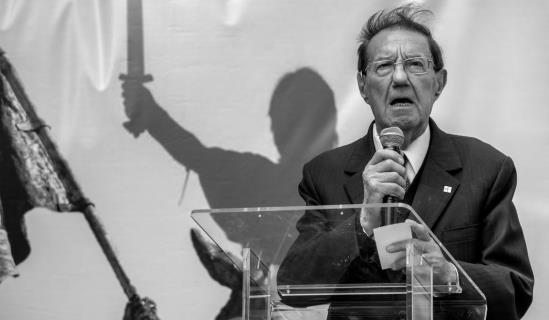
Pierre Sidos, death of an antisemite
Author: Max-Valentin Robert, ERC PRIME Youth Project Researcher, European Institute, İstanbul Bilgi University, and Ph.D. Candidate in Political Science at Sciences Po Grenoble, UMR Pacte, France.
On 4 September 2020, the neo-fascist activist (excluded from the National Front in 2011) Yvan Benedetti posted the following tweet: «Pierre Sidos left us on 4 September. France loses one of its best children and nationalism, one of its best soldiers! Throughout his life, his honour was called Fidelity: Fidelity to his name and Fidelity to an ideal struck with the Celtic Cross! Pierre Sidos? Present![i]»
Pierre Sidos’ journey illustrates the meandering path taken by the French extreme-right from the Second World War to nowadays. Born into a family ideologically committed to fascism, he collaborated actively with the Nazis during the Occupation, by joining the ranks of the Militia (a paramilitary force created in 1943 by the Vichy regime, which fought against Resistance) at sixteen years old, like his father, who was executed at the Liberation. In January 1946, Sidos was sentenced to national degradation and forced labour for having been a member of Marcel Bucard’s Francist Movement (an antisemitic and fascist organisation founded in 1933, which collaborated with German occupiers). He was sent to the Natzweiler-Struthof camp before being granted amnesty at the end of the 1940s.
In 1949, Pierre Sidos co-created the movement Jeune Nation (Young Nation) with his brother Jacques (who was also tried after the Liberation for acts of collaboration). As the historian Nicolas Lebourg explains, this extreme-right organization went even further into radicalisation under Sidos brothers’ direction, by making contact with German Nazis (ex-members of the Propagandastaffel) who had fled to Sweden[ii]. Pierre and Jacques Sidos then prepared stockpiles of weapons, hoping for an overthrow of the Republic by force: «According to the intelligence services, the group would have had 112 members in 1952, then up to 500 in 1954. But, with the choice in 1956 to declare itself neo-fascist and to take over its weapons’ stockpiles, it lost burst and was down to around 50 members at the very beginning of 1958.[iii]»
After his struggle in favour of the Vichy regime, the other decisive episode in the life of Pierre Sidos was his commitment to French Algeria. Jeune Nation collaborated with the Secret Armed Organisation (Organisation armée secrète – OAS), a paramilitary movement that led terrorist attacks to oppose the decolonisation process. But Jeune Nation’s relationship with violence did not only manifest itself during the Algerian War of Independence. In 1956, its activists attacked the headquarters of the French Communist Party (Parti communiste français – PCF) to protest against the repression of the Hungarian uprising by Soviet forces: this attack caused hundreds of injuries, and several deaths, as Nicolas Lebourg recalls[iv]. However, Pierre Sidos’ ideological position contributed to marginalising the weight of his organisation within the French extreme-right. Sidos endorsed nationalism and was obsessed with maintaining the colonies and preserving the French empire. In contrast, a growing part of the extreme-right (influenced by the ideologue Dominique Venner) increasingly asserted itself as European and advocated going beyond the idea of nationhood in favour of the white race. In 1968, Pierre Sidos founded the Petainist and antisemitic movement L'Œuvre française, before handing over its leadership to Yvan Benedetti in 2012. Pierre Sidos also supported Holocaust-denial activists, such as Maurice Bardèche or Robert Faurisson. He was invited on the TV talk show Ciel mon mardi! in 1990, and when asked about his antisemitism, he replied that he was «no more and no less than Saint Louis» (in reference to the King of France who imposed a policy of persecution against Jews). After the death of the anti-fascist activist Clement Méric, this organisation and other extreme-right movements were dissolved by the Minister of the Interior, Manuel Valls.
The ideological heritage of Pierre Sidos is today claimed by the small group «The Nationalists,» founded by Yvan Benedetti. During the Yellow Vests movement, the neo-fascist activist organised a meeting with other antisemitic ideologues (Alain Soral, Hervé Ryssen and Jérôme Bourbon) during which he called for an insurrection against the Republic - arguing that the real meaning of RF on town hall pediments is not «République française» (French Republic), but «Rothschild Frères» (Rotschild Brothers). The Petanist newspaper Rivarol paid tribute to Sidos by describing «an exceptional nationalist leader and activist», and stating that «Pierre Sidos has always been intractable on the Jewish question and on the existence of the State of Israel. The matrix of anti-Zionism is Pierre Sidos and L’Œuvre française»[v]. The self-described racist activist Henry de Lesquen evoked «a man of faith and conviction, inflexible in his convictions, brave and intelligent, and truly worthy of esteem»[vi]. Likewise, Jean-Marie Le Pen declared on Twitter: «The death of Pierre SIDOS concerns this great national and patriotic family that we served and guided, often in our own different ways. And yet... I salute his memory.[vii]»
[i] Twitter account of Yvan Benedetti, 5 September 2020. Available on : https://twitter.com/Yvan_Benedetti/status/1302200300024061952
[ii] Quoted in PLOTTU Pierre, MACE Maxime, « ‘’ Pierre Sidos était décrit avant tout comme paranoïaque et psychorigide’’ », Libération, 7 September 2020. Available on : https://www.liberation.fr/france/2020/09/07/pierre-sidos-etait-decrit-avant-tout-comme-paranoiaque-et-psychorigide_1798805
[iii] Quoted in Ibid.
[iv] Quoted in Ibid.
[v] BOURBON Jérôme, « Pierre SIDOS (1927-2020) : Chef et militant nationaliste d’exception », Rivarol, 9 September 2020. Available on : https://www.rivarol.com/editorial
[vi] « Henry de Lesquen | Des Gilets jaunes au covid-19, le pays réel entre révolte et soumission », YouTube, 7 September 2020. Available on : https://www.youtube.com/watch?time_continue=2&v=6X--Z_yQARY&feature=emb_logo
[vii] Twitter account of Jean-Marie Le Pen, 5 September 2020. Available on : https://twitter.com/lepenjm/status/1302213941716832257


